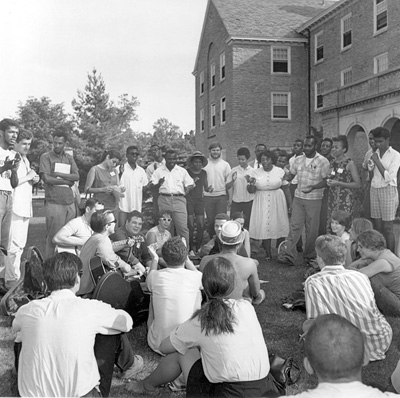Postscript to “Mississippi Freedom Summer—Deep and Important Lessons”
July 21, 2014 | Revolution Newspaper | revcom.us
To the editors:
I have received a number of comments on the letter/reflection I wrote about the documentary on Mississippi Freedom Summer ("Mississippi Freedom Summer—Deep and Important Lessons"). In thinking about these, there is one important point that I would like to add. It's like a "p.s." to a letter—but one of those postscripts that bear on the letter as a whole.
One thing that very strongly came through in the film was not only how these students were willing to put a lot on the line, but how making this choice gave powerful and irreplaceable meaning to the lives of those who made it. All that SNCC offered was intense struggle side by side with masses up against a vicious, violent power structure... some hardship and a whole lot of risk... and the chance to change the world in a meaningful way. People agonized—one woman describes how the volunteers were told to call home the night the news came in of the disappearance of Chaney, Schwerner and Goodman and how her parents told her that she should "do what she had to do." Stacked against what U.S. society had to offer—the promise of a comfortable spot in society if they'd just go by the rules—people made their choice. And they almost all ended up casting their lot with the brave people in Mississippi—the SNCC volunteers who had been "on the ground" for several years, and the masses themselves who had been braving murder and other reprisals for years with very little notice or outcry.
It is clear from the interviews and the show overall that this choice—to be part of something uplifting, centered on the fight against injustice, no matter what the potential sacrifices—was one that not only contributed to changing the course of history, but also gave tremendous meaning to the lives of those who made it. This comes through overall, and especially in the final interviews of the show. One woman describes how she fell "in love with the people... the wholeness that you have when you're working as part of something that's meaningful..." When you feel that, she said, "It's very, very hard to go back ... to some staid life." A man says, "I hope I made a difference [to the people in Mississippi], but I don't have any doubt that the person who benefitted the most from my being in Mississippi was me... [I got] an understanding of race that it's impossible [for a white person] to get any other way."

In 1964, the Student Non-Violent Coordinating Committee (SNCC) invited students to Mississippi as part of the resistance to the terror and segregation against Black people. On the basis of good orientation, these students played a critical role in drawing the attention of the world to the outrages in Mississippi. At the same time, they gave encouragement to the people. Even more important, the masses in Mississippi, the students who came down, and the whole society learned a tremendous amount about the nature of this system. Above: Training session on the campus of Miami (Ohio) University in Oxford, Ohio. Photo: AP
It is clear, as you watch, that this is not being said in some narrow sense, where the point was "self-fulfillment" or "finding out who you were"—the point was actually that in the process of subordinating himself, subordinating his own interests to something larger, a whole world opened up. In the course of doing that, something powerful and important happened to the people who did it.
This contrasts sharply with the dominant ethos of self-indulgence in today's society. Even among those who want to do something beyond that, the path of "social entrepreneurialism"—of "doing well while doing good"—is held out as the alternative. How puny that is up against what SNCC offered then... and what revolution offers today.
This is true for students—and it is true as well for young people on the bottom of society, facing futures where no real promise is held out. The chance to eradicate injustice, to change the world and to learn and connect, to be part of transforming people and in the process to change yourself—there is no greater opportunity that exists.
Lenny Wolff
Volunteers Needed... for revcom.us and Revolution
If you like this article, subscribe, donate to and sustain Revolution newspaper.
